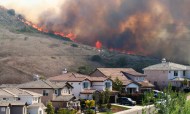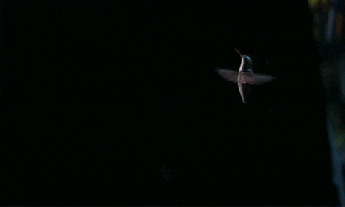Andreas Raptopoulos and his colleagues at Matternet are attempting to create a network of drones that operate like the internet, only for tangible objects. This company — which sprung out of an idea surfaced at Singularity University in 2011 — aims to deliver items wherever they are needed, even if no usable roads go there.
In his TED Talk, Raptopoulos explains why a system like this is needed — to reach the one billion people worldwide who don’t have access to all-season roads. He also wowed the TEDGlobal 2013 audience when he landed one of Matternet’s drones on the TED stage, smack dab in the middle of the red carpet.
This week, he told TED more about the Matternet concept.
“At the inception of the internet, who would have anticipated the explosion of social networks, of machine-to-machine awareness, of distributed workflows, of the disruption of the music, video, photography and TV markets, Bitcoin or Snapchat?” he said. “The internet connects information, but it hasn’t connected all people. We’re designing the very edge of the web that can reach every unnavigable place where there’s human need.”
Matternet is a big idea. Below, read the real-world applications — two that Matternet has field tested and four that are still concepts.
Matternet has done this:
- Delivered medical supplies to places in need. Matternet conducted one of its first field trials in Haiti in September 2012, testing three remotely piloted drones to see how they functioned in both urban and rural areas. The most fascinating use? Delivering medications to camps set up after the earthquake of 2010. “The system that is used currently is antiquated, to put it mildly: one big truck delivers one big box of medicine to a remote clinic every quarter,” Raptopoulus told TED. “It’s quite inefficient and very wasteful. There is no tracking, no information on if the medicine is used or not — and it’s very hard to predict demand and real needs for medicine in some part of the country. So the application we’d like to see there is routine, just-in-time logistics of much more discrete packages, exactly when you need them.” He stresses: “In places of extreme need … the aim should be to leapfrog rather than try to catch up on old practices and systems.”
- Delivered supplies, information and diagnostic tools between medical centers. Around the same time, Matternet ran its second field test in the Dominican Republic, flying supplies and diagnostic tools from big healthcare centers to smaller ones in remote areas, and zipping samples back for analysis. They hope to turn this test into a year-long project to improve healthcare service for the poor and low-income populations of Samaná, where 60 percent of people live in rural areas. Paola Santana, Raptopoulos’ co-founder at Matternet, told TED, “We’re working with one of the big development banks in the region to fund this project.” And while they haven’t field tested there, Matternet has also thought a lot about Lesotho, and how Matternet could connect HIV/AIDS clinics there to provide better care and faster tests for patients. “While the battle against the disease is being won in most of the world, it’s being lost in Lesotho,” says Raptopoulos.
Matternet could do this in the future:
- Help in disaster response. When an earthquake or tsunami hits, Matternet could potentially be a way to get supplies to people in need, before assistance in the form of manpower can arrive. Raptopoulos asks, “Can we help immediately after a disaster with first response? Instead of sending one big helicopter out, can we send 100 of these vehicles? After the first few days, can we rely on a system like Matternet to do routine transportation of small packages to get a country going again? Our answer is ‘yes.’”
- Create a courier service that can’t get stuck in traffic. In both Haiti and the Dominican Republic, Matternet tried this, though on too small a sale to be considered a trial. “Port Au Prince has few roads and they are quite congested,” says Raptopoulos. “Several years after the earthquake, tens of thousands of people still live in temporary shelters and camps — as is typical in many regions that have experienced a natural disaster.” As for Santo Domingo, he says, “It’s an emerging city, growing quickly, and roads can get very congested in peak hours.” Now, to get hypothetical, imagine this in megacities like New York or Tokyo.
- Deliver food. Matternet could also be very effective for getting food and water to areas that need it, especially in times of disaster, war or crisis. The trick here will be increasing Matternet’s load size. Currently, it is able to transport a two-kilogram load, covering a ten-kilometer distance in 15 minutes. As the weight-bearing ability increases, this use will become more and more viable.
- Support the freedom to live where there aren’t roads. Marc Shillum, Matternet’s Creative Director says, “People live far away from roads for many reasons. Some have no choice, some are seeking seclusion … That’s a whole load of people who also can’t access the world’s products, services or care. We want to bring fulfillment to where need exists rather than where roads end. The beauty of unmanned autonomous vehicles is [that there’s] no physical infrastructure. UAVs fly wherever there is air.”
Overall, Matternet’s work is very much in the spirit of Lian Pin Koh and Henry Evans, whose TED Talks this week also described other ways that drones could be used for good. Lian Pin Koh described how drones can help with conservation, tracking animal populations and surfacing poachers. Meanwhile, Henry Evans shared how robots and drones can serve as an extension of the body for the severely disabled.
Matternet is thrilled to be a part of this growing field of enquiry. “When we started, no one was talking about the positive value of drones,” Raptopoulos tells TED. “Today, there are plenty of players in the ‘drones for good’ business — which makes us happy. [But] our mission is bigger than drones. We want to create a network that is designed around human need, rather than the limitations of the antiquated technology that formed our current transportation system.
Matternet is looking to create a sister non-profit organization called Drones4Good, to explore and promote positive drone applications. Right now, it’s just a Twitter feed that collects articles and studies on these applications. But two years from now, who knows? If anything is for sure, it’s that drone technology is advancing quickly.


















